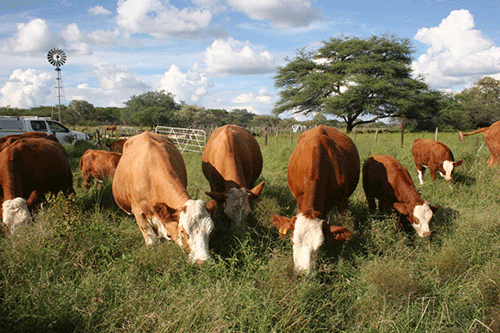Agribank’s loan book significantly increased from N$194 million reported in 2022 to over N$284 million recorded as of 31 March 2023, which saw a total of 564 clients benefiting from various loan products.
The latest figures were shared at the bank’s recent annual general meeting held in Windhoek. The bank revealed that loans worth N$98.2 million for land purchases were advanced and livestock loans to the tune of N$76.8 million were issued during the 2023 financial year.
A total of 134 122 hectares were
purchased during the year under review, which marks a considerable increase from N$55.1 million and 57,965 hectares
recorded in 2022, while livestock loans increased from N$52.2 million in 2022 to N$76.8 million.
The bank’s customer base also increased from 440 clients recorded in 2022 to 564 in 2023, while loans extended to women increased to N$55.4 million from N$30.1 million as reported in 2022.
Youth loans rose to over N$30.6 million in 2023 from N$20.5 million recorded in the prior year. The bank also supported full-time communal farmers without collateral through its Emerging Retail Financing Product (ERFP), providing over N$25.2 million, up from N$12.6 million in the previous fiscal year.
Agribank’s CEO Raphael Karuaihe said prudent expenses management, enhanced momentum on sales growth and the sales automation initiatives were key focus areas for the review period.
He said going forward, the bank will focus on strengthening engagements with the government, forging strategic partnerships across the agricultural value chains, developing a sustainable funding model, enhancing collection and arrears management, auctions prevention strategy, aligning product innovation and inclusion as well as compliance with the Public Enterprises Governance Act.
Additionally, the no-collateral scheme loans backed by salaries aided employees engaging in part-time farming were issued to the tune of N$13.5 million in 2023 compared to N$10.1 million in 2022.
Surplus recorded
Agribank’s chairperson Josephat Mwatotele acknowledged the bank’s commendable financial performance, which resulted in a surplus of N$49.5 million.
“I am encouraged by the sales and collection efforts that are on an upward trajectory, despite operating in a very difficult environment,” Mwatotele stated.
He emphasised the challenges posed by the weather patterns, frequent droughts as well as global events that are continuously increasing input costs and thereby squeezing the disposal income of farmers.
The focus moving forward includes stakeholder engagement, operational efficiencies, and an enhanced complaints management system to improve customer service, underpinned by best governance practices.
Finance minister Iipumbu Shiimi applauded the bank’s board members and management for playing an active role in the transformation of agriculture, by contributing to efforts to remove barriers across the agriculture value chains.
Shiimi urged the bank’s leadership to create opportunities for farmers and encourage them to adopt climate-resilient practices.
The minister also indicated that his ministry is working on new approaches to the governance of public enterprises, which include the coordinated board development programme for State-owned enterprises, lifting of key performance indicators from strategic business plans, leadership development within SOEs as well as formalising performance culture as some of the key requirements for reporting at AGMs and public enterprise governance going forward.



